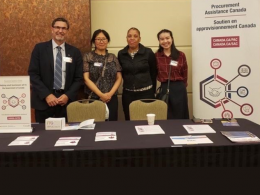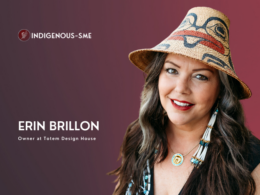In a compelling interview with IndigenousSME Business Magazine, Jordan Peterson, founder of Affinity North, delves into his extensive leadership experience and its impact on advancing self-determination and reshaping the relationship between Indigenous communities and Canada. He emphasizes the significance of integrating Indigenous knowledge and perspectives into governance and legal frameworks, advocating for a partnership approach built on respect and understanding. Peterson, drawing from his roles with the Gwich’in Tribal Council and in intergovernmental relations, outlines the importance of Indigenous participation in decision-making and the integration of environmental sustainability into policy. Leading Affinity North, he ensures his work reflects the empowerment of Indigenous communities, aligning with the values and aspirations of his Gwich’in heritage. Peterson addresses challenges in negotiations and leadership, emphasizing the need for Indigenized training and collaborative strategies to foster sustainable growth and cultural preservation. His commitment to true reconciliation involves creating inclusive spaces and advocating for policy changes that support Indigenous self-determination and prosperity, offering advice on meaningful engagement and collaboration with Indigenous communities.
From Aklavik, NT, Jordan Peterson is a Gwich’in advocate known for his influential work in Indigenous rights within Canada. As the youngest elected Deputy Grand Chief and Chief Negotiator for the Gwich’in Tribal Council from 2016 to 2020, he was pivotal in promoting self-determination and advancing Gwich’in interests. His leadership extended to negotiating crucial Land Claims amendments and towards a Gwich’in Self-Government Agreement, significantly reshaping the relationship with the crown.
Elevating Indigenous issues on a global platform, Jordan also co-chaired the Gwich’in Council International at the Arctic Council, championing Arctic Indigenous voices from 2016 to 2020. His founding of Affinity North, an Indigenous-owned consultancy, and his stewardship in modernizing the Gwich’in Comprehensive Land Claim Agreement, which garnered the 2019-2020 NWT Premier’s Award for Excellence, underscore his commitment. Jordan’s academic pursuits, including an Executive MBA in Indigenous Business Leadership, complement his extensive fieldwork, marking him a steadfast advocate for the worlds Indigenous Peoples.
With your extensive experience in leadership roles such as Deputy Grand Chief of the Gwich’in Tribal Council and Director of Intergovernmental Relations & Governance, how have these positions influenced your approach to advancing self-determination and forging a new relationship with Canada?
My experience serving as Deputy Grand Chief of the Gwich’in Tribal Council and Chief Negotiator and as Director of Intergovernmental Relations & Governance significantly shaped my approach to advancing self-determination and reshaping Canada’s relationship with Indigenous communities.
Self-determination embodies more than autonomy; it embraces the responsibility for stewardship and sustainability of the environment and Indigenous peoples’ Free Prior and Informed Consent (FPIC) on any development in their traditional territories. In these leadership positions, I’ve learned that meaningful progress occurs when we ensure Indigenous Nations and leadership are central to the decision-making processes in discussions and negotiations with government and industry. Indigenous knowledge and perspectives hold the key to achieving genuine sustainability in the global economy and fostering our Indigenous economies while mitigating and adapting to the impacts of climate change. Integrating this wisdom into governance structures, legal frameworks and policies is imperative.
Forging a new relationship with Canada involves fostering partnerships built on respect and understanding. It’s about recognizing and understanding the truth about the colonial past and creating a relationship that honours Indigenous sovereignty and incorporates Indigenous perspectives into policies, laws, and collaborative efforts.

At the core of this approach lies the recognition that Indigenous knowledge systems offer invaluable insights into environmental sustainability. By prioritizing Indigenous voices in decision-making processes, we advance self-determination and pave the way for a more harmonious and sustainable future for all by not leaving anyone behind.
As the President and CEO of Affinity North, an Gwich’in-owned consultancy, how do you ensure that your work aligns with and actively supports the empowerment of Indigenous communities, particularly in the areas of negotiation, policy, and governance?
As a Gwich’in father, brother, uncle and leader operating and growing Affinity North, I focus on ensuring that our work deeply reflects and supports the empowerment of Indigenous communities, particularly within negotiation, policy, government relations and governance. One critical aspect is aligning my work with the values and perspectives of my own nation. It’s about ensuring that the projects I take on and the strategies I employ resonate with my nation’s cultural values, traditions, aspirations, and teachings passed on to me. This ensures that my work is rooted in the realities and needs of Gwich’in, which can translate to other Indigenous peoples in Canada and beyond. Running a business as a Gwich’in doesn’t mean conforming to Western capitalist models but rather creating my own measures of success as identified in the Ni’inlii Declaration of the Gwich’in Gathering in Vashraii K’oo (Arctic Village) in July 2016.
I firmly believe that business can be conducted in ways that align with Indigenous values and perspectives, but to be more descriptive, business can be conducted in alignment with local and/or regional Indigenous values and principles. It’s about redefining success, incorporating communal well-being and sustainability into our business practices, and showcasing that success doesn’t have to be measured solely in Western economic terms. By staying true to these principles, I aim to set an example that business can indeed be conducted in a way that respects my Gwich’in identity and promotes empowerment, self-determination and self-sufficiency.
Given your background in leadership and negotiation within Indigenous Governments, what are some of the key challenges you have faced and how have you addressed them to foster sustainable growth and cultural preservation?
When I was first elected as the Gwich’in Tribal Council Deputy Grand Chief at 29, I wished there were more ways of Indigenizing negotiations and teaching them. Many Indigenous negotiators practice the Harvard interest-based model and are also community organizers, facilitators, translators, and support economic development, thus needing a specific type of negotiation training for Indigenous people. Throughout my experience in leadership and rights-based negotiations, I have also seen other challenges, including dependency on third-party funding, navigating policy changes and, most importantly, the information disparity and leverage the government and the private sector have over indigenous people. While a single government or company has a depth of knowledge on its negotiations and may deal with numerous “stakeholders.” Indigenous Nations are left at a deficit because they are usually forced into confidential negotiations and may not share information, which continues colonialism and denialism of the truth through modern economic measures.
I try to mitigate this by establishing partnerships and collaborations from the onset; both within Indigenous communities and with external entities. Building partnerships based on mutual respect and shared goals fosters collective action, allowing for the pooling of resources, expertise, and knowledge, significantly contributing to sustainable growth and cultural preservation and reducing costs. As well as empowering communities to develop sustainable economic models, fostering entrepreneurship, and advocating for policies that support self-sufficiency are key strategies.

I am also currently in the process of establishing an Indigenous training business that will encompass diverse stakeholders, including governments, private sectors, Nations, and more. This initiative stems from the recognition of capacity gaps within existing Indigenous training businesses, and it aims to address the imperative of training our community members in the processes of negotiations and other business training and professional development. The overarching goal is to ensure not only the effectiveness of these negotiations but also the empowerment of our community members in actively participating and shaping the future of their Nations. This venture is driven by a commitment to bridging gaps, disruption in current systems, fostering inclusive training programs, and ultimately contributing to Indigenous communities’ overall growth, self-determination and cultural preservation and invigoration.
In your role as a founder of Affinity North and a board member of various organizations, what strategies do you employ to promote the advancement of Indigenous peoples, especially Northerners, within the business community?
Fostering dialogue and collaboration is key. I actively create spaces for discussions, facilitate partnerships, and advocate for the inclusion of Indigenous perspectives in business practices. This involves promoting networking opportunities, encouraging mentorship programs, and establishing platforms where Indigenous entrepreneurs and businesses can connect and thrive. Overall, my approach involves a multifaceted strategy that prioritizes dialogue, capacity-building, policy advocacy, collaborative efforts and getting people in the same room that otherwise would never be. These efforts aim to empower Indigenous peoples, especially Northerners, within the business community, foster economic growth, and create a more inclusive and equitable business landscape by breaking down the imaginable barriers our society has created.
Relationships are key to what we do.
Your commitment to fostering real reconciliation and thriving Indigenous communities is central to your work. Could you elaborate on your concept of true reconciliation and Affinity North’s role in turning this vision into reality?
True reconciliation begins with acknowledging and addressing the deep-rooted inequalities and historical injustices faced by Indigenous peoples. Our approach involves creating spaces for meaningful dialogue, where Indigenous perspectives are heard and actively incorporated into the fabric of our work with our clients through collaborative development and systems thinking.
Affinity North prioritizes empowerment by ensuring that the initiatives are designed in collaboration with Indigenous communities, respecting their values, traditions, and aspirations. Affinity North aims to bridge knowledge gaps and empower Indigenous individuals to actively participate in shaping their future through inclusive training programs, capacity-building initiatives, and fostering partnerships. We advocate for policy changes that support self-determination, cultural preservation, and sustainable development. We aim to create an inclusive business environment that respects Indigenous values and perspectives, where economic success aligns with communal well-being and environmental stewardship.
Our vision of true reconciliation involves a holistic approach that embraces the empowerment of Indigenous communities, fosters genuine partnerships, and advocates for systemic changes that honour Indigenous rights and perspectives. Affinity North serves as a catalyst in turning this vision into reality by actively engaging in initiatives that empower, uplift, and support Indigenous communities in their journey toward self-determination and prosperity.
As someone deeply committed to advancing Indigenous communities and fostering meaningful reconciliation, what advice would you offer to individuals and organizations looking to effectively support and engage with Indigenous communities and initiatives?
For those seeking to effectively support and engage with Indigenous communities and initiatives, I emphasize the importance of collaboration and integrating Indigenous knowledge into whatever project or engagement you do. Trust and respect are foundational in establishing authentic relationships and integrating Indigenous perspectives into decision-making processes is crucial, as is involving Indigenous leaders and community members throughout project lifecycles. Partnerships should be built on mutual respect and equality; valuing Indigenous nations and leaders as essential collaborators by fostering Indigenous autonomy in these collaborations would benefit all parties involved.







